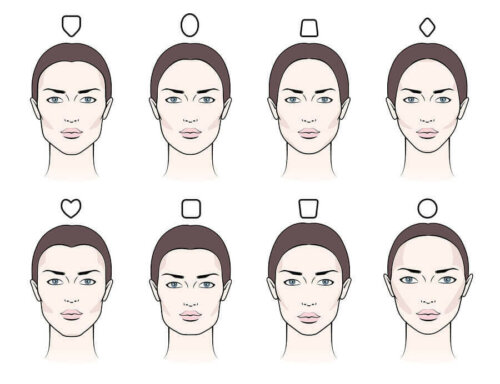Facial Shape and Your Personality

Physiognomy is a pseudoscience based on the idea that it’s possible to determine the type of personality of a person by studying their facial shape. Thus, it may be interesting for you to know the ancient Greek thinkers worried about their appearance. Some philosophers felt that their appearance reflected the state of their souls.
Today, the topic continues to be a subject of interest. You may not know it but the facial shape and its link to personality are included in the analysis of body language carried out by experts. However, there are still many unknown things and myths surrounding the face as an object of study.
According to popular belief, facial features can indicate certain qualities. For example, people attribute to those with round cheeks as more tender and having a caring character than those with angular faces. Let’s see more below.
What does your facial shape say about your personality?
Jean Haner, who is known as an “expert in face reading” comments, through his book The Wisdom of Your Face, that the facial shape “tends to reveal the basic personality and the general approach of the lives of many people”.
Furthermore, after studying face-reading techniques that are more than 3,000 years old, derived from traditional Chinese medicine, Haner points out that it’s possible to recognize some characteristics of the person according to their facial shape. We’ll lay it all out below.

Oval faces
Oval faces have a high forehead and a jaw that is a little narrower than the cheeks. As one of the most common shapes, this shape is well-balanced. It has large features and is easy to analyze.
According to personality tests, many individuals with this type of face tend to be very correct and proper in their behavior. They weigh the consequences and tend to say what society considers to be acceptable when making important decisions. They come across as very happy. At the same time, they can be rather timid with people they don’t know.
See this article Five eating habits that can destroy your face
Round facial shape
Firstly, the shape of the round face is almost as wide as it is long. This gives people the impression that you’re young and innocent. Many people associate this shape with children. Because of this, they become confused and perceive the person to be too innocent.
Nevertheless, a person with a round face may be very secure, mature, and responsible for making the right decisions. Regardless of what some people think, these individuals are not necessarily immature. They can easily establish relationships, help others, and be friendly.
Heart-shaped faces
Secondly, this shape has features similar to that of a round face, but with more prominent cheekbones that expand when the person smiles. To some, these visual characteristics are associated with friendliness and idealism.
Some people claim that individuals with this type of face have a powerful inner strength that can easily be passed on to others. Those with this facial shape may be creative, decisive, persevering, and willing to overcome fears when they strike out on a new adventure.
Long, narrow faces
Next, this face shape is longer than it is wide and the chin may be fairly prominent. Because of these characteristics, some people can become confused and think the person is very serious and has a bad temperament.
In spite of this, when you get to know them, these people might be as friendly as anyone else and full of positive energy. They may also know how to socialize. They can also take charge and tend to have leadership qualities.
Square faces
This face shape tends to be similarly wide and long, even though sometimes it may look longer than it is wide. The forehead and jaw have sharp angles. A few people say that this can allow the person to be more expressive with their emotions.
Some people with this facial shape can be secure, intelligent, and one who has logical thoughts. Although others perceive these individuals to be perfectionists and not very sociable, the truth is that you might just find an interesting soul if you give them the opportunity to establish a relationship.
Diamond-shaped faces
Finally, this shape is also known as a triangular face because the jawline is wide and the forehead is narrow. The chin is narrow, slightly pointed, and tends to be somewhat angular and bony. This shape is not very common and some may feel that it represents a mysterious or obnoxious person.
Others can have the perception that this is a manipulative person. They might surprise such people, though, as people with this facial shape may be fairly friendly when you get to know them. Many of these people have leadership qualities and are constantly successful.
Color also matters

Moreover, other than the aspects mentioned regarding the shape of the face, some experts add that color also reveals something about people. In addition, this does not have to do with race, but tones that the skin acquires that can give information about lifestyle.
For example, a healthy color could indicate that a person has a strong immune system and possibly has a good diet. A pinkish color may indicate anxiety, but at the same time, it’s a sign of good circulation, fertility, and active life. Finally, yellow, pale, or grayish skin can indicate nutrient deficiencies, fatigue, or illness. So consult your doctor as soon as possible if you notice these symptoms.
All cited sources were thoroughly reviewed by our team to ensure their quality, reliability, currency, and validity. The bibliography of this article was considered reliable and of academic or scientific accuracy.
- Fisiognomía. (s.f.). En Wikipedia. Recuperado el 7 de mayo de 2020 de https://es.wikipedia.org/wiki/Fisiognom%C3%ADa
- Won, A. S., Bailenson, J. N., & Janssen, J. H. (2014). Automatic detection of nonverbal behavior predicts learning in dyadic interactions. IEEE Transactions on Affective Computing, 5(2), 112–125. https://doi.org/10.1109/TAFFC.2014.2329304
- Haner, J. (2009). The Wisdom of Your Face. https://www.jeanhaner.com/books/the-wisdom-of-your-face/
This text is provided for informational purposes only and does not replace consultation with a professional. If in doubt, consult your specialist.








